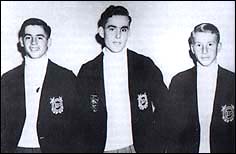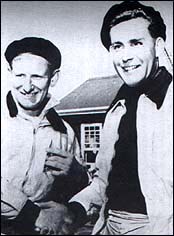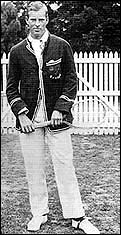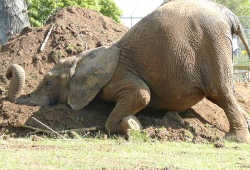Ray Harrison and Maurice Agar – 3/3/00
Ray Harrison, deeply involved in the yachting world, nominates the Mander
family as making an outstanding contribution to yachting, and Maurice Agar,
Chairman of Canterbury Tennis Inc, nominates Anthony Wilding as New Zealand’s greatest tennis player.
|
|
| The Mander brothers, Graham, Peter and David in 1950; even then with a total of nine national titles to their credit. Photo source “Ebb and Flow” with permission |
The Mander Brothers For the Manders yachting dominated family life. As I wrote in the book,
Ebb and Flow, a Centennial History of the Christchurch Yacht Club 1891-1991, “there was a family ‘think tank’ approach to the sport”. The Mander parents were enthusiastic about yachting and worked hard for the
club and helped many young people develop their skills in the sport.
Peter’s successes Peter Mander (4.7.28-21.6.98) won his first national title in the 1945 Cornwell Cup regatta – the first of a dozen national titles gained in seven
different classes, in addition to two world titles and an Olympic gold medal in 1956 – the first Olympic gold medal for yachting won by New Zealand.
Mander was one of a few yachtsmen who realised that yachting could not become a New Zealand Olympic sport unless a national organisation was formed. The nearest we had was the annual Sanders Cup conference and from this originated the New Zealand Yachting Federation which held its inaugural annual meeting in 1954, its primary purpose being to affiliate with the NZ Olympic and Commonwealth Games Association in order to enter a
yachting team in the 1956 Olympics.
Although it was virtually unknown in New Zealand, the Canterbury syndicate chose the Sharpie Class as, from their point of view, the more promising of the three Olympic yachting classes. Two yachts were built and
a third resurrected and modified to comply. The national trials were held
at Lyttelton and resulted in a narrow win for Peter Mander and Jack Cropp in Jest, over Graham Mander and Tiger Wilson in Quest . The Auckland and Wellington representatives were outclassed. So began the qualification for Melbourne which led to New Zealand’s first yachting Olympic gold.
|
|
| Gold medal winners Jack Cropp (left) and Peter Mander Photo source P.G. Mander |
In preparation for the Olympics Mander and Cropp raced against Quest all winter. As with the current America’s Cup series, the unsung heroes are the crews in the second boat which, racing against the yacht in
the limelight, bring it to peak performance. In those days there were no
wet suits, no commercial sponsors, and little assistance outside the family. The yachties built and repaired their own boats, sailed their own races, and surprised the yachting world by winning the gold medal for the Sharpie class in the Melbourne Olympics.
Mander also won the New Zealand yachting representation in the Olympic Finn
Class at Tokyo in 1964. There misfortune cost him the silver medal when, leading towards the finish of the last race, gear failure on his Japanese-provided yacht reduced his points to fourth over-all.
His success was not simply because he was a skipper of superior sailing and
technical ability, but because he brought his whole intellect to bear upon
the complex problem of boat speed on all points of sailing. He read, studied, discussed, experimented and discarded or adopted countless ideas,
many of which paid off. He recognised the value of sail shape and the bearing of rigging upon it. He introduced innovations in standing and running rigging, sail setting, hydrofoil under-water gear, remotely controlled pumps, self-draining devices, controllable, flexible rigs, trapezes and out-board hung rudders. He was concerned to work on any detail which would improve boat speed, but not for commercial gain. He was
not only an outstanding helmsman, but also a designer, boat builder, sail
maker and rigging specialist par excellence.
Service to the sport He also gave of his time on the administrative side of the sport locally and nationally, holding positions in the Christchurch Yacht club and becoming President of the New Zealand Yachting Federation in 1959. He served for many years on the New Zealand Olympic and Commonwealth Games Committee.
In 1978 he was appointed Yachting Manager for the coming Moscow Olympics. He accompanied the team to the pre-Olympics regatta at Tallin but New Zealand eventually withdrew from this event as part of a world-wide protest. His final appointment of significance was as Project Manager to the New Zealand America’s Cup Challenge in 1986 at Perth where his rich and varied experience was invaluable in so many ways.
Recognition for his services and his successes For his services to New Zealand yachting he was awarded the Sir Bernard Fergusson Award for Yachtsman of the Year in 1972 and the New Zealand Yachting Federation’s Merit Award in 1989. In 1990 came the highest sporting honour when along with his former Olympic crew Jack Cropp, he was
elected an inaugural member of New Zealand’s Sports Hall of Fame. In 1992
he was awarded an OBE in the Queen’s Honours for services to yachting.
He continued to work voluntarily for yachting at local, provincial and national levels right up to the time of his death in 1998. Peter was also
well known in Canterbury businesses for many years as managing director of
Deanes Industries, and as a director of other companies.
The roles of Peter’s brothers Graham and David Peter’s brothers, Graham and David, are less well known, but have both won
national titles, Graham thirteen plus NZ Olympic representation and David
three. Like Peter both have given generously of their time and served voluntarily on the administrative side of the sport and also in coaching countless others.
The sport of yachting has been much enriched by the Mander family.
Nominated by Ray Harrison Ray has sailed for most of his adult life, has been a local, national, and
international yachting judge and was closely associated with Peter Mander
for many years.
Canterbury’s Greatest Tennis Son … Anthony Wilding 1883-1915 That is how the chapter about Anthony Wilding is headed in the book “100 Years 1890-1990 Canterbury Lawn Tennis Association”.
“Choosing a player of the century in any sport is usually well-nigh impossible. But for Canterbury’s 100 years of tennis, there is no doubt –
Anthony Wilding remains the greatest player Canterbury – and New Zealand –
has produced.”
|
|
| Anthony Wilding, Canterbury and New Zealand’s greatest player. |
Wilding’s successes Wilding won four consecutive Wimbledon singles (1910 to 1913), four Wimbledon doubles titles (1907, 1908. 1910 and 1914), combined with Australian Norman Brookes to win the Davis Cup as Australasia four times (1907, 1908, 1909 and 1914), was New Zealand champion three times (1906, 1908 and 1909). and won the world hard court championship, two Australian
singles titles, the South African championship, and countless important tournaments throughout Europe.
A sporting background His father, Frederick Wilding, was an outstanding sportsman who achieved success in running, long jump, rowing, boxing, billiards, shooting rugby,
cricket and tennis. Anthony’s older brother won two national tennis doubles.
Early interest in sporting activities At an early age Anthony walked long distances, learnt to swim and ride a pony. At eleven years old he rode fifty miles on horseback to a farm on the banks of the Rakaia River. He was good at cricket, rugby, roller skating, rowing, shooting, and fishing. He began to learn to play tennis
on the court at his home and acted as ball-boy for Sunday afternoon games.
His father was his first coach, and Anthony considered he was his best. He was strict with his son and particularly critical of any double faults.
First championship success at seventeen At seventeen he won his first Canterbury Championship and began serious fitness training which had not been part of the programme of most earlier
tennis players who regarded the game as a largely social activity. Tennis, training and rugby interested him more than his studies in law at
Canterbury College. He was then sent to Cambridge to study law in 1903.
Being at Cambridge the catalyst to his tennis successes While at Cambridge he won the Scottish championship and had his first contact with Wimbledon, the scene of his later successes. His contemporaries at Cambridge were surprised by the emphasis he placed on training to keep fit.
Brief return to New Zealand He completed his law degree in 1906 and in 1909 qualified for the New Zealand bar, but he didn’t continue to practise law. He set up a business
tuning and repairing motorcycles and rode his motorcycle long distances on
the then primitive New Zealand roads. However he was happiest in England
and returned there and worked as a business representative in jobs that gave him freedom to play his tennis.
Davis Cup match when World War 1 broke out Wilding and Australian Norman Brookes were winning a Davis Cup match in New
York as the Australasian team when news came of the declaration of war.
Killed on active service Wilding returned immediately to England and enlisted. He quickly became a
captain in the British Expeditionary Force fighting in France. He was leading a scouting car force when he was killed on May 9, 1915.
Tribute from Norman Brookes Norman Brookes who was his partner in many of his successes said of him: “Without doubt one of the finest physical specimens of manhood physically,
he was blessed with an ability and steadfastness of character which helped
him to reach the highest pinnacle in the lawn tennis world and his bright,
cheery nature made him beloved by all followers of the game.”
Nominated by Maurice Agar In addition to being an enthusiastic player and representing Canterbury Maurice has been involved in tennis administration for thirty years. For
seventeen years he was on the Policy Council of New Zealand Tennis. He has
been president of New Zealand Tennis and is currently Chairman of Canterbury Tennis Inc.






